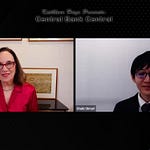Jacob Frenkel has a long and illustrious career first as a highly-regarded academic, as a professor at the University of Chicago, and also as a mentor to many students who have become highly regarded economists themselves. He was a two-term governor of the Bank of Israel, former chief economist and director of research at the IMF, and former Chairman of J.P. Morgan International. It would make much more time to list all that he has done and been.
I caught up with him as he put on yet another one of his caps as Chairman Emeritus of The Group of Thirty to attend a meeting here in New York this week. This, after he had a whirlwind trip around the world including stops in China and Europe. Usually we start with an in-depth look at the Fed and global central banks. Given that the world is now fixated on Trump 2.0, we start on what he has been hearing from policy makers around the world on his trip.
Jacob notes that normally because he has been a top central banker, on these trips that’s what people ask him to discuss. This time he says is different. The number one subject is Trump.
Here are some highlights.
Concern Growing Globally over Trump’s Use of Tariffs as Main Policy Instrument
00:02:20:13 - 00:03:09:00
Trump not as a person, but how will the world look during Trump's presidency? And you know, everything that people read is associated today with tariffs. Trump has, in terms of the international community, has focused his messages on immigration policy and on tariffs. For he tariffs is the main policy instrument, I must say, for me, as a professional economist and for many economists, we are all typically concerned with the use of trade protectionism as the main policy instrument.
After Long Period of Globalization World Worries About Strategy to Decouple
00:03:09:10
We can understand that they will use it <tariffs> as a negotiating tool. But at the end of the day, once the negotiations are over, there are great benefits from trade and <we> may have maybe great damages from restricting trade. So we will need to see. But there is no question in my mind that in China, in Latin America, in Europe, there is a great concern and worry about how will they address the world in which we have had already a long period of globalization, of integration, of interdependence, and now the strategy is to decouple.
Interdependent World Depends on Maintaining Rules of Globalization
00:04:26:02 - 00:04:56:00
…when people speak about deglobalization, let's not have any illusion that the world, therefore is less interdependent. It is still the case that when my neighbor sneezes, I get pneumonia. The point is that in a world in which the rules of the game of globalization are put aside, we do not have the machinery to address the interdependence.
Tariffs Have Consequences, Other Countries Planning Now to Retaliate
00:05:25:09
You know, tariff is really a combination of a subsidy to domestic producers and a tax on domestic consumers, and we don't need to confuse the two. The fact, however, is that it has consequences. Nobody today will sit idle and wait and see. Let's see what the Americans are doing to us. They are planning now how to retaliate.
And you know, you are going to have tariffs on China, probably the highest rate, tariffs on Latin America, Mexico, limitations on immigration, tariffs on Europeans may be and they will retaliate. And in a world in which the rules of the game are all tariffs and retaliations, tariffs and retaliations, it's the rules of effect. And I in a world in which the rules are I feel and I know a lot of blind people are there
Flawed Trade System Needs Repair, Not Scrappage
00:06:58:03 - 00:07:22:05
We think it could make some aspects of this global trade system more efficient. There is no question that there are a lot of valid concerns on the part of the US in this particular case, especially in the areas of technology. And you don't want your property rights to be a stolen, you don't want to to have to do face unfair competition.
These are the rules of driving, but you do not reduce car accidents by closing the roads, but rather by making the roads more safe. And I think that in this context, the idea of communication is extremely important and one should not think about it across the board. There are areas where there are very legitimate concerns, and that's especially, as I said, in a technology area and they should be addressed, but they are addressed around the table not by shooting but by communication.
What Central Banks Should Do Instead of Being Data-dependent -
00.20:43:18- 00:21:11:10
“…you try to anticipate when it's the next turn, when the world is bumpy. You react, you move right, you'll move left, that's what makes it professionalism, But, yes, you may make a mistake. Our job is to minimize the incidence of mistakes as well as the cost of a mistake and that's why we always say the economy has to be resilient, knowing that there will be shocks, knowing that there will be mistakes, but you need to be able to absorb them quickly… So, yes, this what makes it an art. That’s why computers cannot run policy.”
On the question of the Fed and global central banks Jacob also shared more of his views on data dependency, on the reliance on models in setting policy, and why policy must be forward looking, .
So sit back and hear, see what Jacob Frenkel has to say.













Share this post